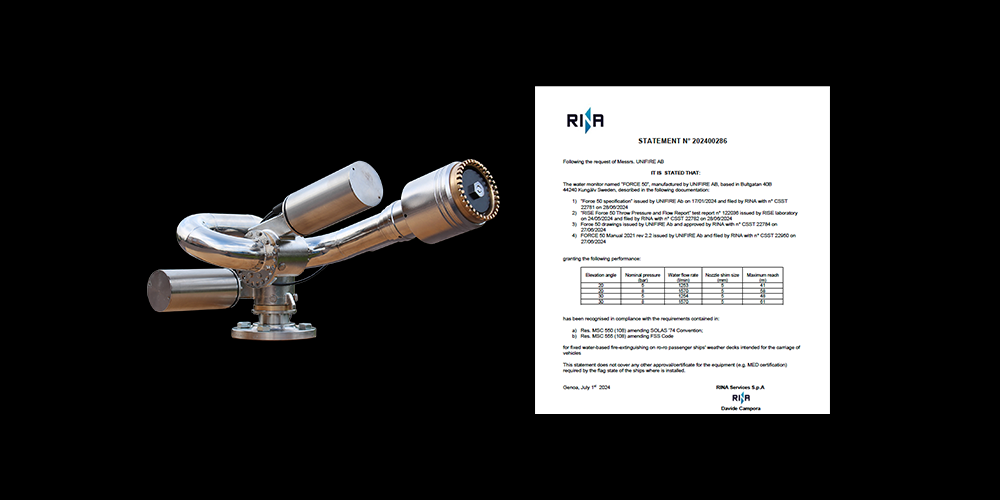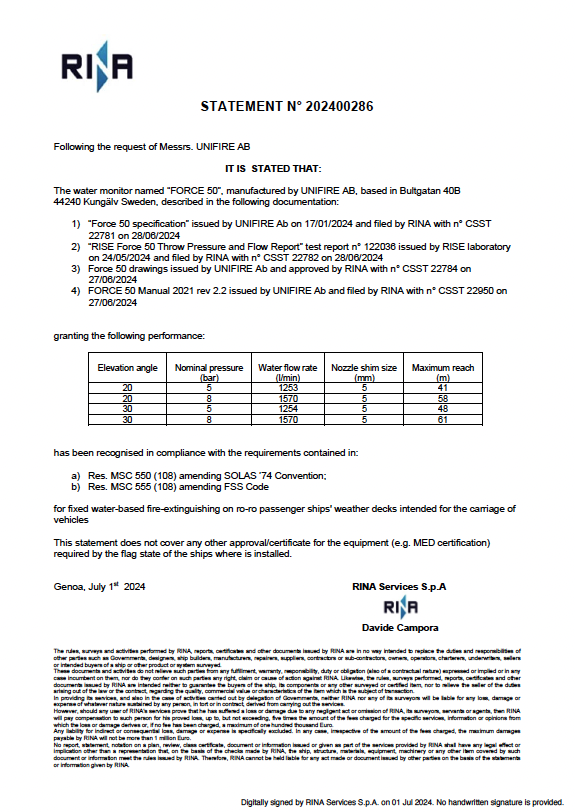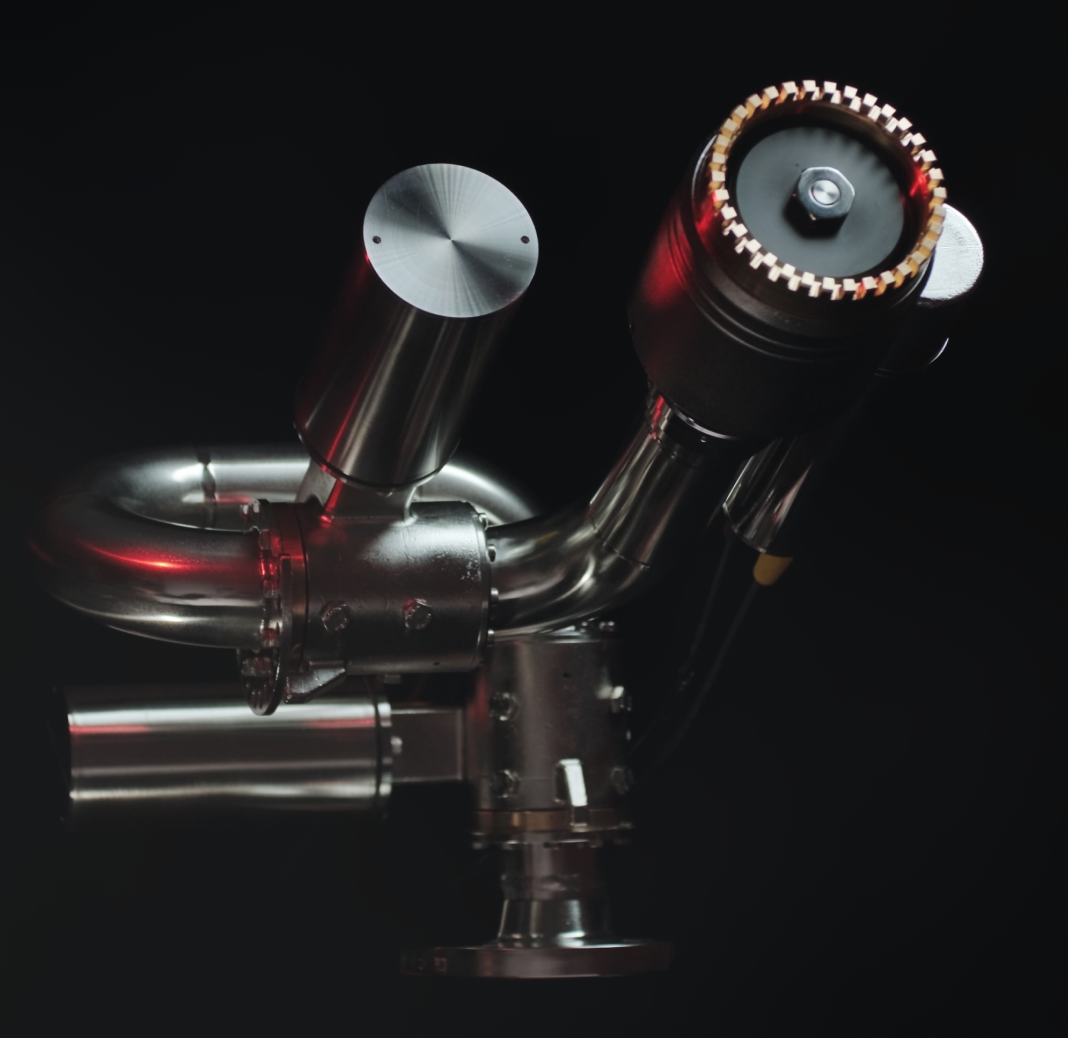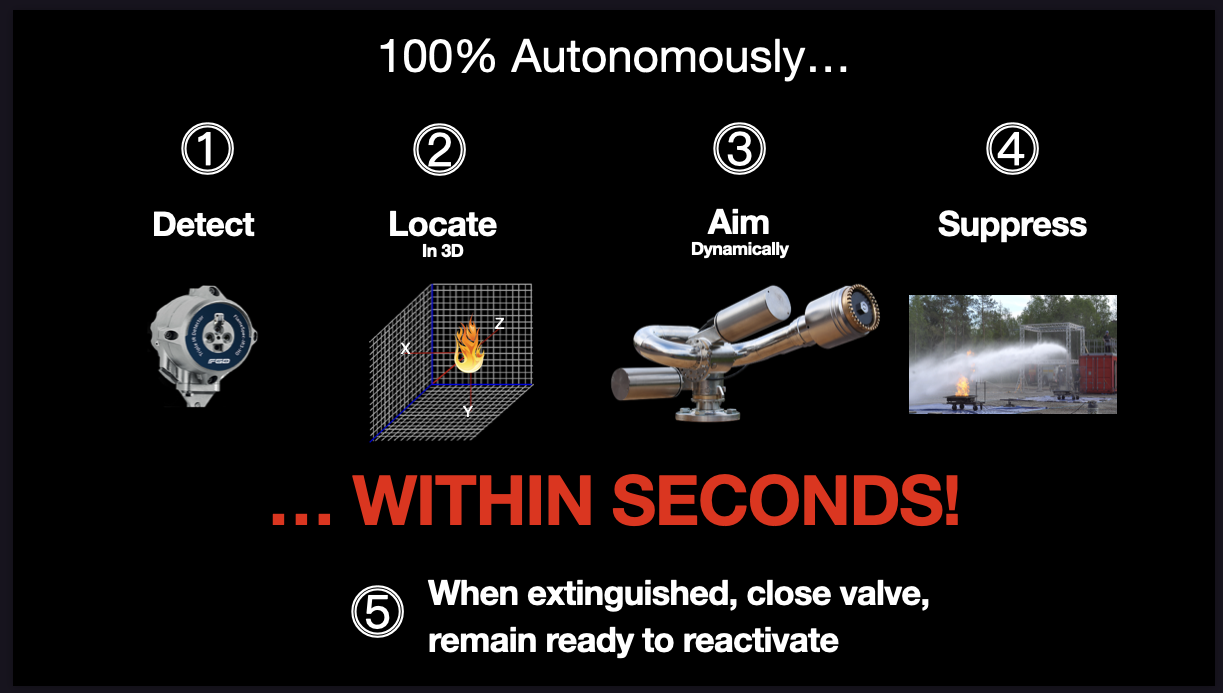
Unifire’s Force 50 Fire Monitors Attain RINA Compliance to New SOLAS & FSS Code for Ro-Ro Passenger Ship Weather Deck Fire Protection
Unifire AB of Sweden is thrilled to announce a significant milestone in maritime safety. According to an official statement issued by RINA, Unifire’s Force 50 fire monitors have been officially recognized as compliant with the new Safety of Life at Sea (SOLAS) regulations and the new Fire Safety Systems (FSS) Code. Furthermore, Unifire is ready to apply for a RINA Type Approval certificate upon official publication of the new SOLAS and FSS Code regulations. Accordingly, Unifire anticipates that it will have the first Type Approved fire monitor on the market in compliance with the new SOLAS regulations.

The Force 50 is a state-of-the-art, extremely high quality stainless steel remote control fire monitor. It is very low maintenance and made specifically for the extremely harsh environment found on ro-ro passenger ship weather decks and other marine applications.
The New SOLAS & FSS Code Regulations in a Nutshell
In May, 2024, the Maritime Safety Committee (MSC) of the International Maritime Organization (IMO) adopted revisions to the SOLAS regulations and the FSS Code to enhance safety measures on ships. Official publication of the new regulations is expected soon. Among other changes, the new regulations will require that:
- Ro-ro passenger ships constructed on or after Jan 1 2026: a fixed fire detection and fire alarm system shall be provided for the area on the weather deck intended for the carriage of vehicles. The fixed fire detection system shall be capable of rapidly detecting the onset of the fire anywhere on the area. Furthermore, a fixed water-based fire-extinguishing system based on monitor(s) shall be installed in order to cover weather decks intended for the carriage of vehicles. The monitor(s) shall comply with the provisions of the Fire Safety Systems Code.
- Ro-ro passenger ships constructed before 1 January 2026: a fixed fire detection and fire alarm system should be provided for weather decks intended for the carriage of vehicles (MSC.1/CIRCULAR.1615, 26 June, 2019); and a fixed water-based fire-extinguishing system based on monitor(s) shall be installed in order to protect areas on weather decks intended for the carriage of vehicles. Passenger ships with vehicle, special category or ro-ro spaces constructed before 1 January 2026 shall comply with the requirements of paragraphs 6.2.3 not later than the first survey after 1 January 2028.
For more detailed information on the new regulations, please visit: https://unifire.com/adopted-new-solas-fss/.
Why Compliance Matters: The Role of Unifire’s Force 50
Compliance with the new SOLAS regulations and FSS Code is not optional; it is mandatory. Thousands of ro-ro passenger ships, both existing and under construction, must ensure their weather decks are timely equipped with Type Approved fire monitors.
The Unifire Force 50 has already been recognized by RINA as compliant and is expected to receive full Type Approval upon the official publication of the new regulations, expected soon. This makes the Force 50 a crucial asset for ship owners and operators aiming to comply with these stringent safety requirements.

Unifire’s Force 50 is poised to be the first fire monitor to receive Type Approval for use on ro-ro passenger ship weather decks under the new regulations. This positions Unifire at the forefront of maritime safety, providing ship owners with a reliable and compliant solution to protect their vessels and passengers.
FlameRanger: Enhanced Autonomous Safety Combining Fire Detection & Fire Monitors
Fires grow exponentially. For this reason, immediate intervention is crucial to successful fire containment and reducing the risk of fire spreading out of control. The benefit of rapid autonomous intervention by combining fire detection with the fire monitors cannot be overstated.
Did you know that Unifire is also the industry leader in fully autonomous weather deck fire protection systems? Unifire’s FlameRanger combines the SOLAS-compliant Force 50 fire monitors with SOLAS-approved IR3 flame detectors to provide rapid, reliable, fully autonomous fire detection and accurate, intelligently guided fire suppression. Because the system uses IR3 flame detection technology—the best fire detection method according to the LASH FIRE study—the risk of false alarms is extremely low. What’s more, at any time, the system can be remote controlled by human operators from the bridge and other safe locations.

FlameRanger is the only autonomous fire monitor system that has been extensively and successfully third-party tested for weather deck fire protection, and has been proven to successfully detect, locate and accurately suppress fires, typically in under 15 seconds.
This means that ship owners and operators can now, from a single source, not only meet both the fire detection and fire monitor requirements of the new regulations, but also take advantage of the enormous benefit of commencing fire suppression in seconds, rather than the typical 5-12 minutes it typically takes crew to respond. To learn more about FlameRanger weather deck systems, see: FlameRanger Weather Deck Systems.
Stay Ahead of the Curve
As the 2026 and 2028 deadlines rapidly approach, it’s imperative for ship owners to begin preparations immediately. By choosing the Unifire Force 50 and Unifire’s FlameRanger systems, you ensure compliance with the new SOLAS and FSS regulations regarding fire monitors, safeguarding your vessel and passengers. Don’t wait until the last minute—equip your ships with the best in fire safety technology today.
Ensure your ro-ro passenger ship is ready for the future with Unifire’s innovative and SOLAS compliant weather deck fire safety solutions.
For further inquiries, and to learn more about how Unifire can help you meet these new safety standards, visit Unifire.com.
